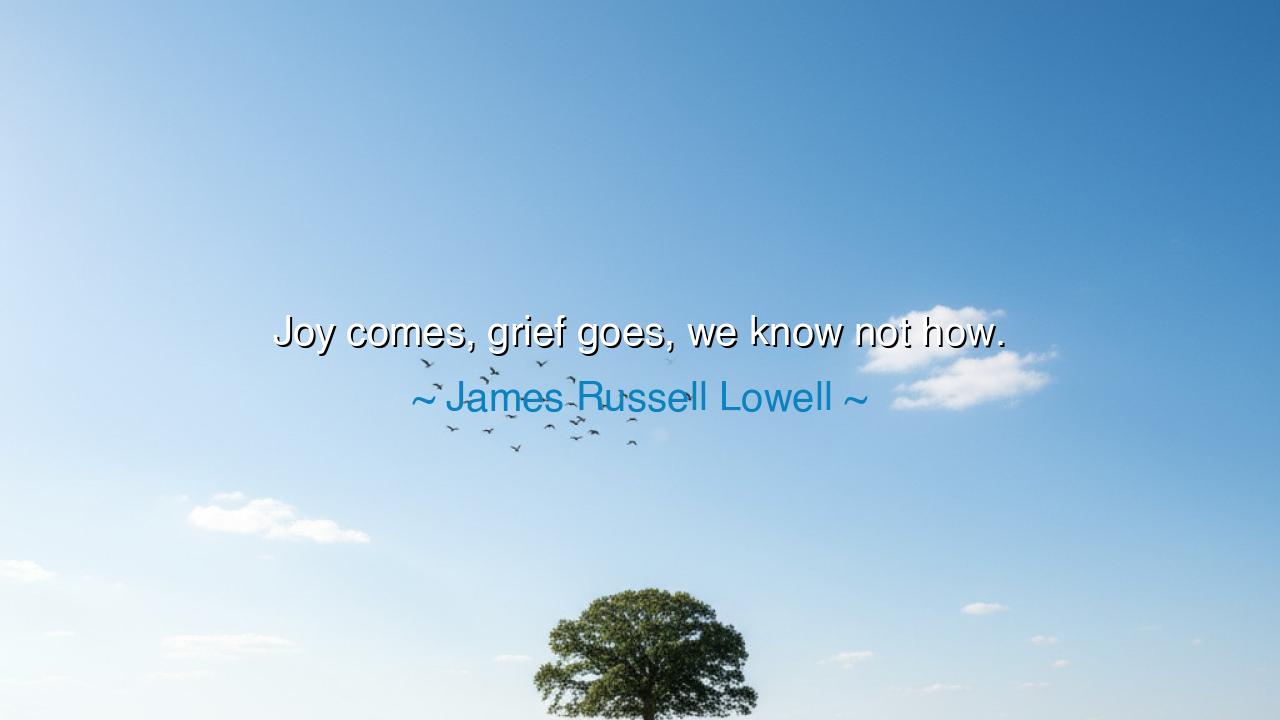
Joy comes, grief goes, we know not how.






“Joy comes, grief goes, we know not how.” Thus wrote James Russell Lowell, poet and thinker, whose words capture one of the oldest mysteries of the human heart. For in this brief saying he gives voice to the ebb and flow of the soul, which, like the sea, rises and falls without our command. Joy enters our lives unexpectedly, like a dawn breaking through clouds. Grief departs in ways we cannot trace, like shadows retreating from the light. The movements of these two powers are beyond reason, yet they shape the very essence of human existence.
The ancients knew this truth well. They taught that life is a cycle: sorrow and delight chase one another as day follows night. The Stoics counseled men to hold lightly to both, knowing that neither was permanent. The Buddhists taught impermanence, that all things, whether pain or pleasure, must pass. Lowell’s words, though modern, carry this same ancient resonance: we do not master joy or grief, but we endure their comings and goings with humility and awe.
Consider the life of Abraham Lincoln, who bore the heavy weight of civil war and personal loss. He buried children, suffered depression, and led a nation torn apart. In his darkest hours, he could not summon joy by will, nor could he cast away grief by command. Yet joy did come to him—in laughter with his children, in small moments of peace, in the triumph of a cause he believed just. And grief, though never fully gone, eased with time and was carried more lightly. His life shows the mystery Lowell speaks of: we know not how these forces move, but move they do.
There is in grief a heaviness that seems eternal when we are under its weight. It clings to the soul like winter frost, convincing us that spring will never return. And yet, without our knowing, it begins to melt. One day we notice the light feels softer, the heart less burdened. The grief has not vanished as if it never was, but it has shifted, grown bearable, even changed into wisdom. This is the miracle Lowell points to: grief goes, though we cannot say the hour or the reason.
And in the same way, joy often surprises us. It does not always come when we call, nor from where we expect. It may spring from a child’s laughter, a friend’s word, the fragrance of flowers, or even the memory of something once lost. Like a traveler arriving unannounced, joy enters quietly but fills the home of the soul with warmth. We cannot control its arrival; we can only welcome it when it appears.
O children of tomorrow, take this to heart: you are not the master of your emotions, but the steward of their tides. Joy comes, grief goes, we know not how. Do not despair when you are in sorrow, for it is not forever. Do not cling too tightly to joy, for it too will pass. Walk instead with balance, holding both in open hands. For the soul that accepts their rhythm will endure with peace, while the soul that resists will break against the waves.
The lesson is plain: trust the rhythm of life. When you are in grief, remind yourself that joy will return, though you cannot see the path. When you are in joy, savor it deeply, but do not demand that it remain. Practically, keep a journal of both sorrows and joys, so that when grief weighs heavy, you may remember past times when it faded; and when joy is present, you may drink from it fully. Let patience be your shield and gratitude your guide.
Thus remember Lowell’s words: “Joy comes, grief goes, we know not how.” Let them be your compass in the shifting seasons of the soul. For though we cannot command joy nor dismiss grief, we can endure both with faith, knowing that change is the eternal law, and that the river of life carries us always forward.






AAdministratorAdministrator
Welcome, honored guests. Please leave a comment, we will respond soon